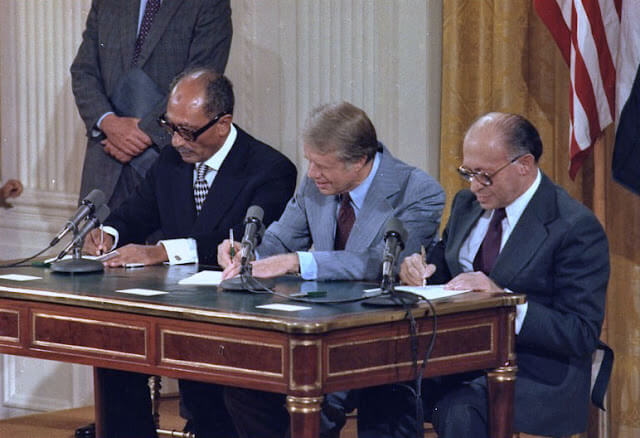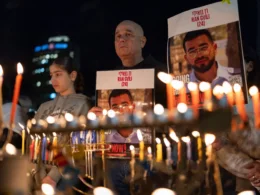As the Israel-Hamas conflict continues to wage on, various media outlets, organizations, and politicians continue to push false narratives against the Jewish state, blaming Israel for deserving the terrorist attack over its "occupation" of the Palestinian people while ignoring critical facts about the Israel-Palestinian issue.
Before the re-establishment of the Jewish state of Israel in 1948, the Jerusalem Mufti Hajj Amin Husseini, the leader of the Palestinian Arabs from the 1920s to the 1940s, told Britain, which was attempting to find a way to establish cooperation between Arabs and Jews in what was then British-mandate Palestine, that residents of Jewish lands would "not be awarded citizenship in our future country.” The Mufti suggested that the Jews be deported from Palestine, rejecting any notion of a Jewish state.
Husseini promised that if a Jewish state was established, the Jews living in it would be expelled from a Palestinian Arab state.
In the Fall of 1947, the Mufti refused to adopt the U.N. partition plan that offered to establish a Jewish State and an Arab State. According to historians and experts, had the Mufti agreed to the U.N.'s plan, the Palestinian Arabs would have gained a much larger area than anything they would have received going forward.
Following the series of invasions by Arab neighbors against Israel, the Palestinian Liberation Organization (PLO) came to form, with its chairman, Yasser Arafat, continuing to reject Israel's right to exist. Under Arafat, Palestinian terrorist fighters engaged in hijackings, kidnappings, and armed attacks against Israel and Jews worldwide.
Arafat and his organization were responsible for various conflicts in the Middle East, including the infamous Black September event in 1970 when he threatened to overthrow the King of Jordan. Arafat also supported the Iran mullahs in their overthrow of the Israeli-friendly Shah of Iran, leading to the formation of the most dangerous Islamic-based regime in the world.
When then-Egyptian President Anwar Sadat signed a peace treaty with Israel in 1979, the PLO called for Egypt to be boycotted. The Arab states adopted that boycott and prevented Cairo from participating in the Arab League from 1977 until 1989. Many of the Arab ambassadors in Egypt were recalled, and Arabs visiting Egypt were considered either traitors or spies.
In 1993, the Israeli government decided to make peace with the PLO, signing the Oslo Accords, whereby the PLO was supposed to renounce terrorism and recognize Israel's right to exist. Additionally, both sides agreed that a Palestinian Authority (P.A.) would be established and assume governing responsibilities in the West Bank and Gaza Strip over five years.
However, despite the flowery promises, Arafat and his organization did not carry out their primary task of stopping terrorism against Israel. Instead, the P.A. did not stop suicide bombers from the Islamic Palestinian group Hamas from carrying out to the streets and buses of the cities of Israel. Even when Arafat and his organization obtained the Gaza Strip, his corrupt practices prevented the area from flourishing.
In July 2000, at a Camp David Summit, the Israeli government offered Arafat a series of concessions as part of a comprehensive peace arrangement. In return, Arafat was asked to end the conflict and assist the Israeli government in stopping Hamas terrorist attacks.
The P.A. rejected the Israeli proposals and never offered a counterproposal. The Palestinian Authority enacted a massive wave of violence known as the second intifada against Israeli civilians and soldiers. According to reports, a total of 1,184 Israelis were murdered.
In 2005, Israel withdrew from the Gaza Strip, handing the entire territory to the P.A. in hopes of a final peace. In response, the Palestinian population elected Hamas to Gaza in 2007 and destroyed the infrastructure, businesses, homes, and greenhouses left behind.
Since then, the Palestinians have been launching missiles and rockets at Israeli towns and villages from the Gaza Strip for years.
In 2008, the Israeli government offered P.A. President Mahmoud Abbas a massive peace proposal, which granted unprecedented territorial concessions. The P.A. rejected the concessions because they viewed the offer as insufficient and stressed the right to control the holy sites in Jerusalem.
Under the Trump administration in 2019, the Palestinian leadership rejected the "Deal of a Century" proposal, refusing to participate in the economic conference held in Bahrain.
Once the plan was published, the P.A. outright refused the offer, which would have led to economic growth and generated new livelihoods for the Palestinian Arabs. Since then, the P.A. has lost its influence among Palestinian Arabs, who have increased their support for Hamas and Islamic Jihad, which have vowed to wipe all Jews from the face of the earth.
Related Story: Palestinian Government Rejects Israel’s Offer of Security and Economic Aid to Prevent Collapse









